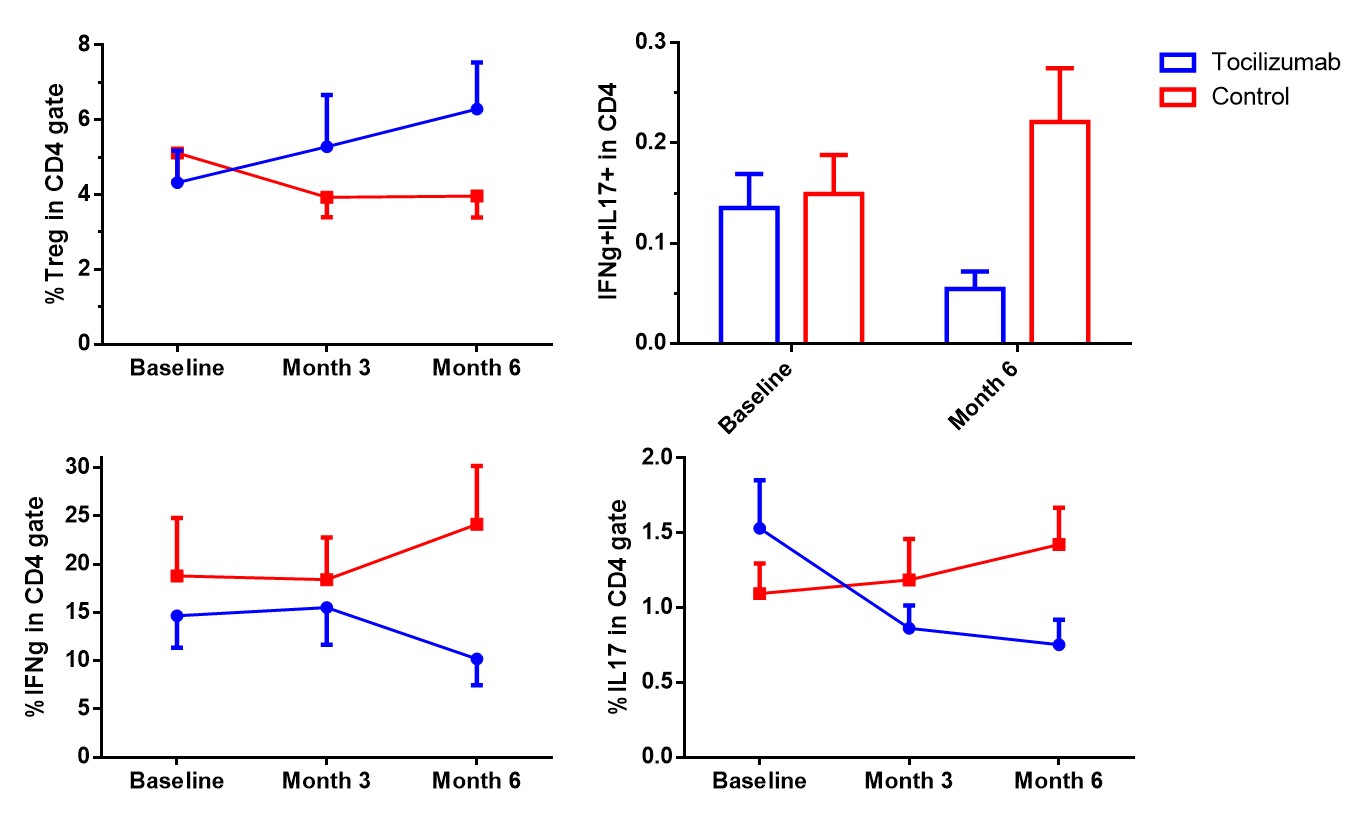IL-6R Blockade with Tocilizumab Increases Tregs and Decreases Early Graft Inflammation in Kidney Transplant Recipients: Results of a Randomized Controlled Trial
UCSF, San Francisco, CA
Meeting: 2019 American Transplant Congress
Abstract number: 426
Keywords: Inflammation, Kidney transplantation, Protocol biopsy, T cell graft infiltration
Session Information
Session Name: Concurrent Session: Kidney: Acute Cellular Rejection
Session Type: Concurrent Session
Date: Tuesday, June 4, 2019
Session Time: 2:30pm-4:00pm
 Presentation Time: 2:54pm-3:06pm
Presentation Time: 2:54pm-3:06pm
Location: Ballroom C
*Purpose: IL-6, a proinflammatory cytokine and key regulator of Treg/Th17 balance, is strongly associated with renal graft rejection. We hypothesized that IL-6 blockade with tocilizumab (TCZ), a humanized monoclonal antibody to IL-6R, would increase Tregs & control graft inflammation.
*Methods: Single center randomized controlled clinical trial (2014-2018) of stable kidney transplant recipients on tacrolimus/MMF/±prednisone with subclinical graft inflammation within year 1. Subjects received TCZ (8 mg/kg IV q4 weeks X6) or no treatment (controls). Kidney biopsies at baseline and 6 months later were analyzed using the Banff classification. PBMCs collected at baseline and 6 months were analyzed with respect to the Treg population, T cell activation, and cytokine (IFN-γ and IL-17) production after ex vivo PMA/Ionomycin stimulation for 4 hours.
*Results: 30 patients were enrolled (see table).
| Control (n=14) | TCZ (n=16) | |
| Mean age, years (SD) | 50.4 (11.9) | 49.9 (11.9) |
| Deceased donor, % | 64.3 | 75 |
| cPRA>80%, % | 21.4 | 37.5 |
| Baseline Banff ti-score (SD) | 0.71 (0.72) | 0.95 (0.68) |
| 6-month Banff ti-score (SD) | 0.86 (0.86) | 0.50 (0.63) |
| Baseline eGFR, ml/min/1.73 m2 (SD) | 55 (13.3) | 65.8 (14.2) |
| 6-month eGFR, ml/min/1.73 m2 (SD) | 57 (18.9) | 70.3 (20.1) |
Mean Banff ti-score in both groups was similar at baseline. At 6 months, a higher proportion of patients in the TCZ group than the control group had a decline in the ti-score (10/16 vs. 3/14, p=0.026). Mean ti-score declined (-47%) in the TCZ group & increased (+21%) in the control group (p=0.13). Functional assays have been completed in a subset of patients (n=20) (see figure).
Mean frequency of CD4+CD25+Foxp3+ Tregs was similar in the 2 groups at enrollment (4.3% vs. 5.1%, p= 0.58). At 6 months, the Treg frequency increased (+50%) in the TCZ group and decreased (-22.5%) in the control group (p=0.012). The frequencies of naïve, central memory, effector memory, & TEMRA cells in both CD4/CD8 T cells remained stable in both groups. Patients in the TCZ group showed a profound decline in IFN-γ (-31%) and IL-17 (-51%) production by CD4+ T cells when compared to control group at 6 months. IFN-γ/ IL17 double producing CD4+ T cells also decreased significantly in the TCZ group (-60% vs. +48%, p=0.02) at 6 months.
*Conclusions: TCZ treatment for 6 months was well tolerated and associated with significantly increased circulating Tregs, decreased effector cell function, and decreased graft inflammation in kidney transplant recipients. Blockade of IL-6 is a novel treatment option to regulate the alloimmune response.
To cite this abstract in AMA style:
Chandran S, Leung J, Laszik Z, Tang Q, Hu C, Joanes M, Vincenti F. IL-6R Blockade with Tocilizumab Increases Tregs and Decreases Early Graft Inflammation in Kidney Transplant Recipients: Results of a Randomized Controlled Trial [abstract]. Am J Transplant. 2019; 19 (suppl 3). https://atcmeetingabstracts.com/abstract/il-6r-blockade-with-tocilizumab-increases-tregs-and-decreases-early-graft-inflammation-in-kidney-transplant-recipients-results-of-a-randomized-controlled-trial/. Accessed February 15, 2026.« Back to 2019 American Transplant Congress

